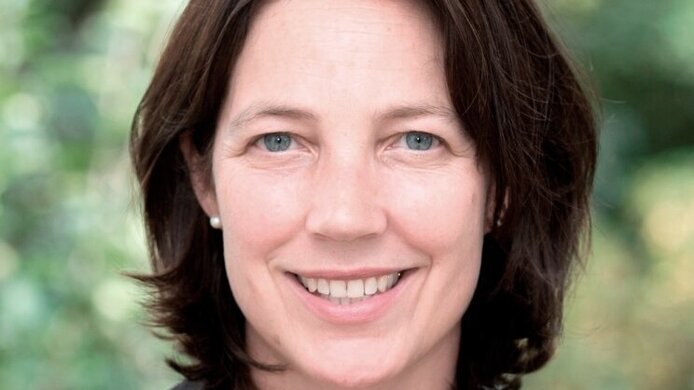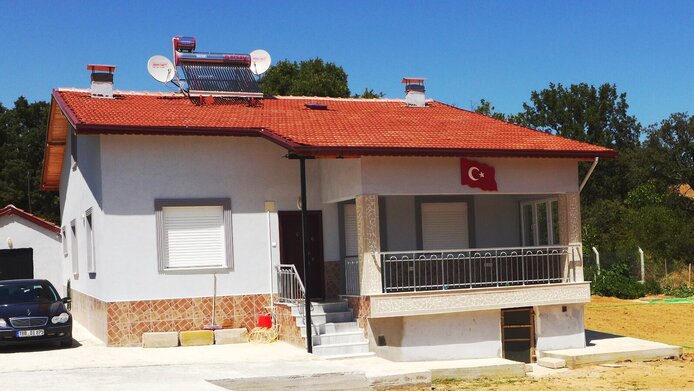Not between, but on two stools

Millions of households in developing countries receive financial support from family members living and working abroad. These financial flows to countries of origin - so-called remittances - are often absolutely vital for providing food, access to education, better housing or support for the development of local business activities. According to estimates by the World Bank, migrants remitted around USD 601 billion to their families back home in 2016. These estimates reflect only sums of money actually transferred - benefits in kind and money taken back in cash are not included. The figures drive home the enormous importance of these remittances for the economies of the countries of origin. In some countries, remittances account for more than 30 percent of GDP. In 2016, Kyrgyzstan was in first place at 35.4 percent, followed by Nepal and Liberia at just under 30 percent and Haiti and Tonga at almost 28 percent.
Social impact
Silke Meyer, a professor at the University of Innsbruck’s Institute of History and European Ethnology, researches remittances not only as to their economic effects, but also seen as a social and transnational practice. One of the issues she investigates is the importance attached to the money by those who remit it and by its recipients, and what sort of leverage comes with it.
Follow the money
Adhering to the ethnological maxim of exploring large social issues via small, manageable fields and everyday activities, Silke Meyer focuses on the small Tyrolean community of Fulpmes in the Stubai Valley in her project Follow the Money. Remittances as Social Practice, which is funded by the Austrian Science Fund FWF and the Province of Tyrol. Due to a labour shortage in the iron industry in the 1960s and 1970s, the area attracted migrant workers from the former Yugoslavia and, above all, from Turkey - the latter predominantly from the western Turkish province of Uşak. Today, one fifth of the 4.000 inhabitants of Fulpmes has family links with Turkey.
Fulpmes and Uşak
Meyer's research focuses on the network of remittances and exchanges between Fulpmes and Uşak and the related effects on family ties, biographies and migration histories. The ethnologist employs a very broad concept of remittance, which includes not only tangible items that are transported back and forth between Fulpmes and Uşak, but also values, ideas and codes of behaviour, e.g. relating to education and training, health care or the attitude towards democracy and co-determination.
Research questions
These are the questions the research team probes: What has changed since the 1970s, when the first migration pioneers arrived? What happens in retirement, when many men and women want to return to their places of origin and expect certain things from the recipients of their remittances, such as being cared for by family members in their old age? How do remittances affect gender roles, for instance when women are responsible for the family finances in the men’s absence?
Investment in education
Meyer's team works with empirical methods such as interviews and participatory observation. One insight she has gained from her work is that remittances are strongly linked to educational goals. In the interview with scilog, Meyer notes that one could also observe that the remitted sums have decreased over the course of time. “The first generation sent every cent it could to Turkey, the next generation already invested more here in Austria,” says the researcher. The differences between the generations also provide potential grounds for conflicts.
Tyrolean houses and knives in Turkey
By now, several migrant workers from the 1970s have built homes back in Uşak. And so one finds Tyrolean-style homes slap in the middle of the province of Uşak. “Probably the only private gym you will find in a home in Uşak belongs to a Turk from Fulpmes,” says Meyer. The kitchen knives produced in Fulpmes are also very popular in Uşak. Conversely, Turkish relatives bring along Tarhana, a Turkish powdered soup, which is produced in an elaborate process. “Just add hot water to get an instant sense of home, so to speak”, says Meyer with a smile.
“The Europeans”
According to Meyer, these examples go to show that “migration relationships are more complex than discussions here in Austria let one imagine”. Her wish would be to see migration discussed not only from the perspective of the host society, but also from the perspective of the society of origin. When the Turks from Fulpmes go back to Uşak in the summer, the locals call them “the Europeans”, for instance. “They travel by car, not only to transport things, but also to impress the people back home with their social standing,” explains Meyer. “We must also include the debate about migration in research,” she insists.
Elective Tyrolean
Silke Meyer has a history of moving around herself. Raised in Reutlingen, Swabia, she went to Tübingen, Sheffield and then Münster, spent four years in London and Nottingham and finally ended up in Innsbruck in 2010. Her son, now eight, who was nine months old when she moved there, considers himself a Tyrolean and is a keen soccer player in Wacker Innsbruck’s junior team. She herself, the “lowlands woman”, had to get used to the mountains that gird the Tyrolean capital. “In Münster, you can see whoever is coming to visit next weekend days ahead of time”, she jokes. In the meantime, however, she has made friends with the high mountains and likes to climb them in her spare time.
From error to main subject
And how did she come to take up European ethnology? Her professional journey started out with a mistake: Meyer enrolled in English literature, Romance studies and art history. Looking for an art history class, the freshman entered a lecture room, settled down and was merely surprised that she was not shown any pictures. “But the guy lecturing was great and I stayed”, she remembers. This guy turned out to be Hermann Bausinger, head of the Institute for Empirical Cultural Studies at the University of Tübingen for many decades. Her time in the UK further informed the thrust of her work: in her thesis she explored national stereotypes in 18th century English prints - especially in caricatures.
Economic ethnology
A personal experience finally led Silke Meyer to her main research focus, economic anthropology: while living in London, she was very thrifty, but her fellow students would go out every weekend - although all of them were in debt and had student loans. “As the daughter of a Swabian teacher, I wondered how you could accept being in debt so easily,” she recalls. She finally explained the difference with the high tuition fees: “In middle class UK families, it's considered completely normal to be in debt when entering working life after graduation. Something affecting many people is taken as the norm. In Germany or Austria this would (up until now) be seen as an exceptional situation,” she analyses.
Debts from a cultural studies angle
Meyer continued to be interested in this topic and, thus, examined the practices of getting into debt and debt relief using the examples of the USA and Germany in cultural studies for her professorial qualification. “While a debt relief programme for private individuals in the USA - called a “fresh start” - takes two to four months from the declaration of bankruptcy, it can take up to ten years in Germany. You are subjected to a hard educational programme involving a 'period of good conduct' in which you will have to commit to certain conditions and duties. It is actually a disciplinary procedure, and you cannot shorten the process by paying back more”, explains Meyer.
Entrepreneurial spirit vs loser
She has a historical explanation for this national difference: “The first immigrants in the USA had to get into debt in order to build a life for themselves. There, debt is interpreted as showing risk appetite and entrepreneurial spirit. In Germany or Austria, you only started a business when you owned either money or land. Hence, if someone ran up debts, they were not acting with an entrepreneurial spirit but were managing their enterprise badly. Hereabouts, debt is not so much an economic as a moral failure.”
Nationality as a characteristic
The migration history of Fulpmes is a success story for Meyer. “The generation of now 20 to 30-year-olds went to school here, perhaps to university, some work as skiing instructors. That their family comes from Turkey is just one of many characteristics”, says Meyer. And in this context, in the perception of ethnicity or nationality, she also sees the key to a differentiated migration discourse: “If we succeed in perceiving nationality as just another characteristic alongside age, gender, occupation, interests, etc., then much has been gained already”, says the ethnologist.
Not between, but on two stools
In interviews Meyer often hears that the pressure to take a stance is great. In reply to the question whether she was Turkish or Austrian, one respondent once said: “This is like having to decide between mother and father in a family dispute. I am both, I’m from here and from there.” Meyer uses the following metaphor: “People do not sit between, but on two stools. While that isn’t always comfortable either, at least it’s not problematic from the outset”. She would like this transnationality to be seen as an asset and not as a deficit.
Transnationality ...
Transnationality is the approach she takes in her work. The example of the Turks in Fulpmes shows that there is not only migration and re-migration, but also a lot of to and fro between the two places. People work in both places, like the young entrepreneurs who are setting up an export company for Tyrolean Simmental cattle between Uşak, Ankara, Fulpmes and Innsbruck. At retirement age, many of those who are still mobile frequently commute between both locations. Then the question arises where people will settle down. According to Meyer, the myth of returning home remains indelible, adding: “Everyone says they will go back, but so far only a few have done so, because their own family is living here. When asked where they want to be buried, however, everyone always says ‘in Turkey’. That's another reason why Fulpmes is discussing whether part of the cemetery should not be reserved for Muslim graves.”
... is not cosmopolitanism
Silke Meyer does not want her transnationality approach to be confused with cosmopolitanism. She sums up: “Although a nation is a historical product of chance and can change at any time, it is perceived as being almost as immutable as gender. The concept of nationhood has swept all before it. Transnationality is not about denying nationhood, but about dealing with national affinities - in daily life, in politics, etc. This must not become a blind spot!” The studies that emerge from Meyer's current project are intended to contribute to a deeper understanding of migration as a key concept of a locally and globally organised society - and thus to a more differentiated discourse on migration.
Silke Meyer was appointed a Professor at the Institute of History and European Ethnology at the University of Innsbruck in 2017. Her teaching and research concentrates on the fields of economic anthropology, but also extends to narrative research, stereotypes, questions of nationhood and national identity, as well as visual ethnography. Meyer studied art history, English and European ethnology in Tübingen, Münster and Sheffield. From 2002 to 2004 she was a university lecturer in the German Department of the University of Nottingham for the German Academic Exchange Service (DAAD), followed by a position as university assistant for European ethnology at the University of Münster until 2010. In 2010 she switched to the University of Innsbruck, where she acquired her professorial qualification in 2015.







